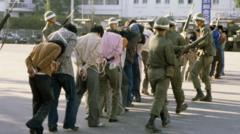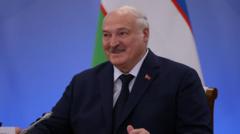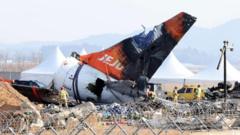As South Korea debates the controversial declaration of martial law by President Yoon Suk Yeol, citizens are reminded of a history marked by trauma and authoritarian rule. The implications of such a declaration resonate deeply in a nation that values democracy after years of struggle.
Martial Law in South Korea: Echoes of History's Trauma Resurface

Martial Law in South Korea: Echoes of History's Trauma Resurface
The declaration of martial law by President Yoon Suk Yeol stirs memories of South Korea's painful past.
In a shocking move that reignited fears of systematic oppression, President Yoon Suk Yeol announced martial law this week—a decision that marks the first such declaration in the democratic era and has sparked outrage across the nation. Koh Jae-hak, an 87-year-old eyewitness of South Korea's tumultuous past, recalls the violence of April 1960, just before martial law was declared in response to student protests demanding the ousting of then-President Syngman Rhee. "I saw soldiers gunning down young women," he recalls. This harrowing memory serves as a stark reminder of martial law's dark history in the country.
South Korea has had a tumultuous relationship with military rule, experiencing 16 instances of martial law during dictatorial governance. Today, this legacy colors the national consciousness, making South Koreans acutely aware of what is at stake. Young citizens, while having never lived through martial law, express a kind of terror at its possible return, propelled by the stories of their parents and the traumatic collective memory that still looms.
Yoon claimed the martial law was essential to counter "pro-North anti-state" groups, but without presenting credible evidence, many began to see it as a tactic to undermine political opposition. The historical precedent of martial law being used to suppress dissent is fresh in people's minds, and protests quickly erupted as citizens and lawmakers rallied against its imposition.
Activists and ordinary citizens echo a central sentiment: martial law represents a regression from the hard-earned democratic freedoms that have flourished in South Korea since the transition to democracy in 1988. Kelly Kim, a civil society activist, articulated the fear that martial law would stifle public discourse and civil liberties once again.
Cultural memory plays a significant role in shaping contemporary viewpoints on martial law. South Korea's creative industries have cultivated awareness around its past, examining incidents such as the Gwangju Uprising through films and dramas. These narratives invoke a strong emotional response from those who recognize the implications of Yoon's announcement. "Are we about to repeat that history?" Marina Kang, a 37-year-old web designer, pondered.
While most South Koreans appreciate democracy as a prized achievement, views remain divided—particularly among older generations—on the justification for previous military interventions. Some see them as necessary measures during an era defined by ideological warfare between communism and democracy. However, the prevailing sentiment today is that a return to martial law is unacceptable.
The recent martial law attempt by Yoon has ignited a national conversation about democracy's fragility, the lessons learned from history, and the determination to ensure such events never recur. As South Koreans hold steadfast to their democratic values, the hope for a future free from the shadows of past oppressions remains strong.





















